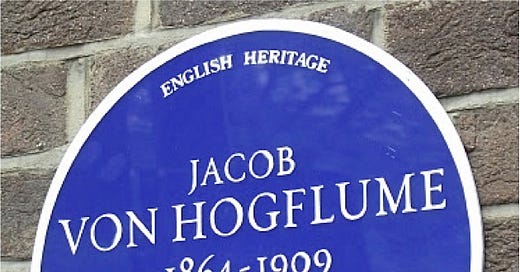In this episode we explore how to tackle the seeming absurdity of so many of the changes that we face
Looking around the world, there can be no doubt now that we’re facing huge, huge changes. Yeah, it’s serious.
Too often, though, the response is the wrong kind of serious. Or, worse, the relentless denial that’s really just the first stage of grief, but on such a global scale that it makes the current challenges even more serious than they already are. Which really really doesn’t help.
What does help, though, is taking a good long look at the absurdity of life, and find a way to laugh at it all:
When we look at it, there’s a kind of dignity there: the dignity of the absurd. And there’s a discipline to it, too, building a deep understanding of the context, and then reaching beyond that, to find a way past the over-serious and over-self-important and then to uncover the absurd humour to be found beyond.
In French culture, for example, one of the greatest masters of this was Jacques Tati, with his films such as ‘M. Hulot’s Holiday’, or his parody of 1950s French modernism in ‘Mon Oncle’, or the early-1970s ‘Trafic’. In the US, we’d see the same in Charlie Chaplin’s ‘Modern Times’ or ‘The Great Dictator’, perhaps, or in the droll deadpan delivery in Bill Murray’s ‘Groundhog Day’ or ‘Lost In Translation’. And in the UK there’s the Monty Python crew, of course, or Rowan Atkinson’s character ‘Mr Bean’ - the latter itself inspired in part by Jacques Tati’s M. Hulot.
One of the related disciplines is that of the court jester. Whilst all of the other court advisers were formal and serious, the role of the jester was to find the absurdity in the situation, and then, more subtly, use wry humour to show the wisdom hidden behind it. Oddly, perhaps, one of the modern masters of that art was the UK’s late Queen Elizabeth II, who almost literally turned the role upside-down, often acting as court-jester for all of the overly-serious politicians and others across the realm and beyond to the wider world. The YouTube video ‘The Queen's sense of humour remembered: from off-mic quips to tea with Paddington’ provides some great examples, such as a session with David Attenborough in the gardens at Buckingham Palace, where they both comment wryly on a sundial now planted permanently in the shade. There’s a helicopter clattering relentlessly overhead: “sounds like President Trump”, she says, with a wicked grin. And she was also famously willing to join in with other absurdities of Englishness, from the James Bond clip at the 2012 London Olympics, to a gentle ‘tea with Paddington Bear’ at her 70th anniversary as queen - almost her last public event.
In another famous tale, there was a Saudi princeling visiting Balmoral, who was invited to go on a drive to view the estate. At that time Saudi Arabia did not allow women to drive, believing them to be incapable of doing so at all. So he was shocked to discover that his driver was not only a woman, but the Queen herself - who then took him hurtling at such breakneck speed through narrow country lanes and steep muddy tracks that he was reduced to crying desperately through his translator to try to get her to slow down. Point made about the real skills and competence of women drivers…
Behind all of this exploration of absurdity, perhaps, is the practical art of improv - improvisational theatre, in particular improvisational comedy. For me, the one book I turn to on this is Keith Johnstone’s Impro: Improvisation and the theatre, with its sections on status-games, how to work with Masks, and much more. There are more details on that on Johnstone’s website, and in an extended book-review by James Clear. There’s also a great guide to ‘the rules of improv’ by Pan Theater, which is well worth exploring to learn how to put all of this into practice.
The point for us, though, is that this isn’t just about comedy. Much more, it’s about how we can use it to support small changes that build towards the big changes that we need - and also help others get there, too. Absurdity isn’t something to fear: it’s a core feature of change, and of the possibility of change. Respecting the dignity of the absurd - working with it, rather than fighting against it - is what makes that possible possible for us all.




Love Johnson’s work. And improv. And the absurd. The absurd is liberating. We no longer need to fret about being right or respected or serious. We can act freely and see what happens. I also like some of Camus’s commentary on the absurd (which is actually pretty dark): https://tempo.substack.com/p/groove
BTW do you know Johnnie Moore? If you don’t then the two of you would get on: https://www.johnniemoore.com/
As you know, I'm a longtime advocate for improv as a valuable practice in business and in life. Johnstone is great. So is Viola Spolin, who used her games to help turn antipathy into understanding between children on Chicago's South Side, who came from different cultures and brought a lot of prejudice [she called it 'pre-judging'] to their initial encounters. Improv theater, and her games applied to its performance, worked miracles. Spolin's son, Paul Sills, co-founded Chicago's famed Second City Theater, and applied his mother's games to comedy. I always tell folks we're leapfrogging back in time, to before that event, when the games were the basis of understanding between children of different cultures. We are, after all, children in an increasingly multicultural world. We can play our way to understanding.